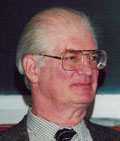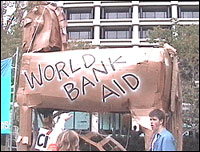If economics is a religion, the World Bank is perhaps its grandest church. For the last half century, the venerable institution at 1818 H Street in Washington, D.C., has been dispatching its missionaries around the globe, spreading the theology of the free market to the heathens.
And if economics is a religion, Herman Daly is its arch-heretic, a member of the high priesthood turned renegade. From 1988 to 1994, Daly was the World Bank’s senior environmental economist, a lonely voice of dissent in an organization that frowns on unbelievers. During his six-year tenure, Daly, the economist-turned-ecovisionary whose works established ecological economics as a discipline, succeeded in getting the World Bank to take notice of the environment in its policies and programs. But he made little headway persuading his colleagues to adopt his more radical views on economic cosmology, which, in his vision, placed the economy squarely inside the global ecosystem, instead of the other way around.
At last, frustrated with the institution’s unwieldy bureaucracy and antiquated policies, he resigned. In his farewell speech to his World Bank colleagues, Daly advised that they take “a few antacids and laxatives to cure the combination of managerial flatulence and organizational constipation,” and prescribed for good measure, “new glasses and a hearing aid” to aid the World Bank in dealing with the outside world.

Herman Daly.
It was Daly’s parting shot not only at the World Bank, but at the entire edifice of neoclassical economics. First a believer, then a reformer, he is now content to remain outside the fold as a professor at the University of Maryland, working not in its economics department but in its school of public policy. “That’s not accidental,” he says. “They [the economists] would not have me, and I would not go.”
Speaking with me on the telephone from his home in Hyattsville, Md., Daly seems an unlikely rebel. He is affable and soft-spoken — but unswerving in his conviction that it is high time for a new world order. “Rather than redemption of the World Bank, I think it’s probably time to have a model of death and resurrection,” he says. “Kill them off and start over again with something new.”
Don’t Bank on It
Daly’s is not the only voice crying out for change. In 1999, when anti-globalization protesters staged the legendary “Battle in Seattle,” the World Bank (along with its sister organization, the International Monetary Fund) gained newfound notoriety in U.S. civil society. The World Bank’s aid programs, designed to open up markets in poor countries to foreign investment, have been increasingly accused of leaving a trail of environmental destruction and poverty in their wake. The bitter legacies of “structural adjustment” programs — under which the World Bank loans money to developing countries on the condition that they slash social spending, eliminate tariffs and subsidies, and shift their agricultural production from feeding their own populace to growing cash crops for export — have sparked a firestorm of protest, both in the developing and the developed world.

Protesting the World Bank
in Washington, D.C.
Photo: Indymedia.org
But despite the global havoc it is wreaking, the institution means well, Daly says. “There are many good people at the bank. Most of them really, sincerely believe the basic model. That’s what they learned in their Ph.D. programs, so they have some reason to believe that what they do is well-founded and will ultimately work out. It takes a bit of a conversion experience to see otherwise.”
At the root of the World Bank’s woes, says Daly, is the fundamentally flawed conception of how economics relates to the physical world — what he calls “the pre-analytic vision” — that every economist learns along with the formulas and equations of the trade. “Most of the people they hire are academic economists who have gotten their degrees at Harvard, Stanford, MIT — standard economics departments. It doesn’t matter whether they came from India or Africa. They all went to the same schools. Their basic way of seeing the world is the neoclassical economic view. They’re basically good-hearted folks out trying to do good in the world, like the church, like the missionaries. But they have a bad theology. They went to the wrong seminary.”
Growthed Out
For Daly, the first real challenge to that pre-analytic vision came in 1967, when he was a Ford Foundation visiting professor at the University of Ceara in Brazil. Daly, who had recently received his Ph.D., had gone to Ceara to help train students for graduate work in economics programs overseas. However, a political dispute shut down the university for several months, leaving him with little to do but read and contemplate his new surroundings.

It was then that Daly began to make connections between his economic knowledge, the experience of life in northeastern Brazil (an economically struggling region whose ballooning population had all but exhausted its natural resources), and the works of environmentalists such as Rachel Carson and Paul Ehrlich. It suddenly occurred to him: Like a human population, when the economy grows, it does so at the expense of the ecosystems that sustain it.
“Once you sit down and draw a little picture of the economy as a subset of the larger ecosystem, then you’re halfway home as far as ecological economics is concerned. That’s why people resist doing that,” he says. “That means you would have to say well, there are limits, we’re not going to be able to grow forever. That means the economy must have some optimal scale relative to the larger system. That means you don’t grow beyond the optimum. How do we stop growing? What do we do? These are very threatening questions.”
It is because these questions strike so deeply at shared hopes and ambitions, says Daly, that most economists do not ask them. “The source of economists’ influence in the world of power, at least in recent times, has been through growth. The solution to all economic problems has been growth. If you’re poor, the solution is growth. If you have unemployment, the solution is you have to increase investment, that means growth. The population explosion — well, there’s a demographic transition, if we just grow enough then people will stop having so many children. And what’s the problem with unjust distribution of income? Well, it’s just that we don’t have enough, so if we grew more it would be easier to divide a big pie than a little pie. It’s just so inconvenient if growth is limited that it’s been hard to contemplate.”
Daly sees conversion experiences like his own as rare events for economists raised in the old ways. Until a new generation arises, armed with a pre-analytic vision that places the economy within physical and ecological limitations, he believes that mainstream economics is unlikely to change. “There’s a buildup of anomalies and vexing questions that don’t make sense under the existing paradigm. And eventually, there’s a tipping phenomenon; it eventually changes. But it doesn’t change because the new rationally makes arguments and convinces the old. It’s that the old eventually dies and the new takes its place.”
While most economists may not be listening, others are. Daly’s work has already inspired one generation of economists and environmentalists, and it forms a large part of the intellectual inheritance of the one that is emerging. Daly’s self-imposed excommunication from the Church of Perpetual Growth has not slowed him down. Rather than being discouraged by the myopia of his erstwhile colleagues, he seems to be following the advice of Mahatma Gandhi: Be the change you wish to see in the world.
